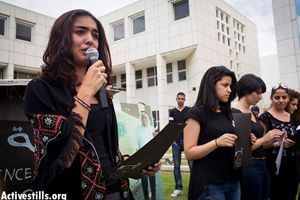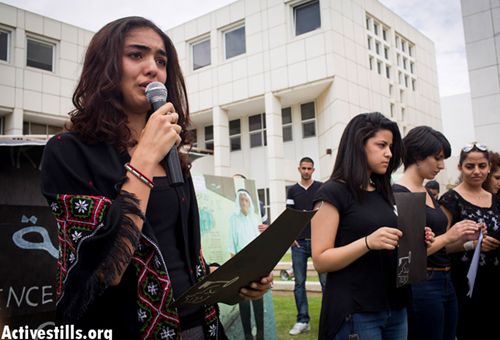
Hundreds of students assembled at Tel Aviv University (TAU) on Monday to commemorate the Nakba (“catastrophe” in Arabic). The day marked the 65th anniversary of the State of Israel’s establishment in 1948, which coincided with the destruction of over 500 Palestinian villages and the creation of an estimated 750,000 refugees.
Nakba commemorations were held this week throughout Israel and the occupied Palestinian territories and abroad. The TAU event’s organizers were students from Hadash (Democratic Front for Peace and Equality). Last year, the mere announcement of the planned commemoration at TAU drew outcry from the extreme-right parties in the Knesset, prompting several politicians to demand its cancellation. But conscientious activists are aiming to start a tradition at the mayor Israeli university, says Hadash student organizer Dan Walfish. He believes acknowledgement of the Palestinian historical experience is indispensable to securing “a better joint future for Israelis and Palestinians.” Unlike last year, no clashes transpired during Monday’s Nakba commemoration at TAU. But the peaceful assembly was not without its detractors: An adjacent counter-protest drew participation from dozens of extreme right-wing activists from Im Tirtzu, an “extra-parliamentary” political organization that “works to strengthen and advance the values of Zionism in Israel.”

An Arab-Palestinian student tells the story of her family, who were forced out of their village in 1948, during an event commemorating the Nakba, held by students in the entrance to the Tel Aviv University, last Monday, May 13, 2013. A right wing demonstration took place against the ceremony, as the protesters were shouting slogans against the participants, under police surveillance (Photo: Activestills)
For Israeli Jews, “understanding the Nakba is the key to understanding many aspects of the [contemporary] Palestinian struggle and the injustice that stands at the origins of the Jewish state,” says Noa Levy, another student organizer at TAU and a member of the Central Committee of the Comunist Party of Israel. Recognition of the Palestinian narrative is central to resolution of almost all outstanding grievances, since “[today’s] land struggles all originate from the same original sin,” she notes. Though the Nakba has been “historically recognized by Palestinians only, and in Arabic,” Levy asserts, organizers of the commemoration at TAU sought to “find ways to speak this subject to all Israeli population.”
Alternating between Hebrew and Arabic, activists used megaphones to read off the names of villages destroyed during the 1948 violence. When Arab-Palestinian students shared their family’s experiences, the focus was not on specific, contentious political issues. Instead, they told stories that humanized the collective pain of dispossession.
Rulah Khalaily, a member of Hadash, recited Palestinian national poet Mahmoud Darwish’s “On Steadfastness”. Another five female students told the audience how their parents’ and grandparents’ generations experienced the pangs of eviction and dispossession, what one student referred to as becoming “a stranger in your own home.”
The “Nakba Law” passed in 2011, authorizes the Israeli government to defund or impose heavy fines on any state-funded or tax-exempt organization commemorating Israel’s establishment “as a day of mourning.” Though TAU falls under this umbrella, the commemoration wasn’t officially affiliated with any student organizations, and thus “there’s no law that we’re breaking,” says Walfish. “We want to show that the Nakba is not an external or distant pain but the story of this land,” Walfish concluded, “and it’s shared by both Palestinians and Israelis.”
Related:
Tel Aviv police besiege and arrested activists planning to commemorate Nakba
Despite law Tel Aaviv university okays Nakba day ceremony
Haifa university bans Nakba day event


